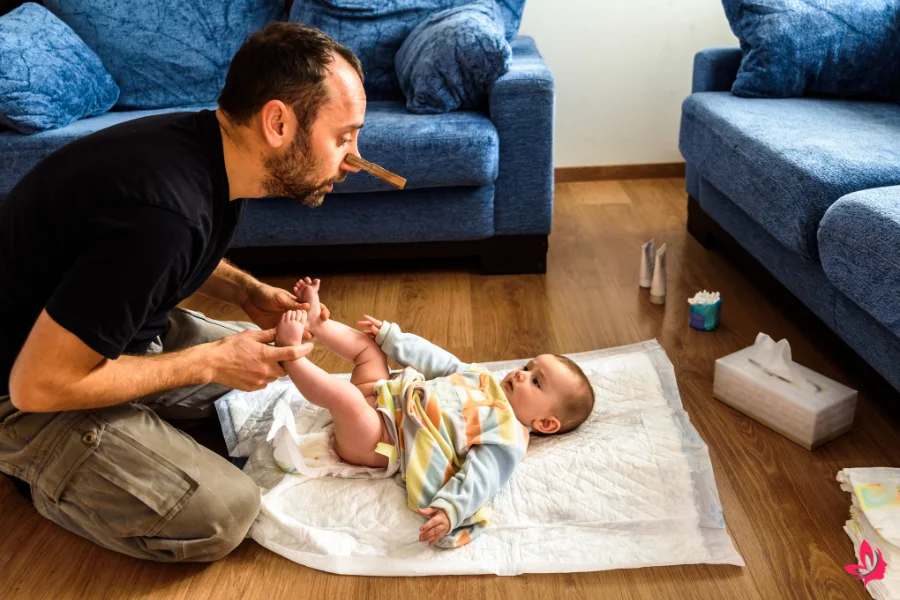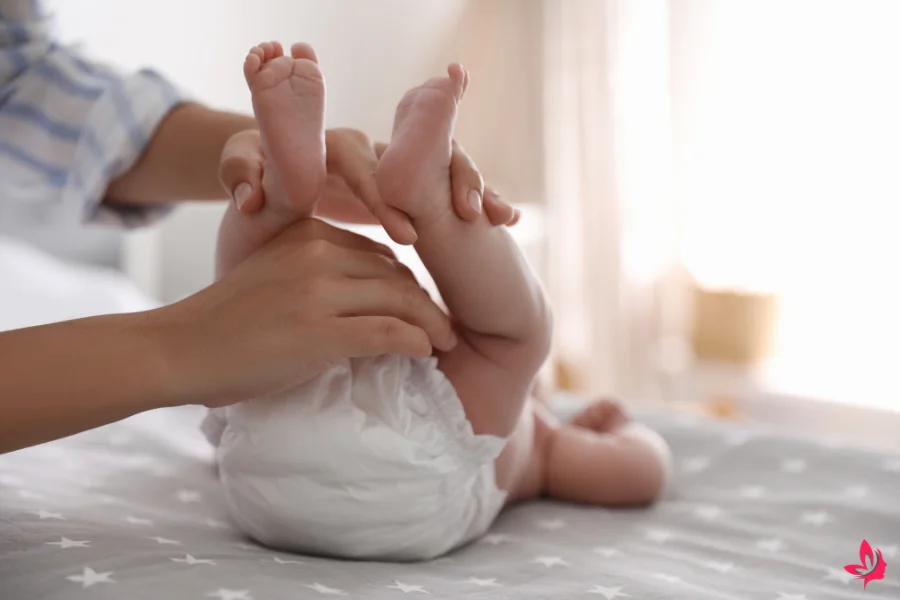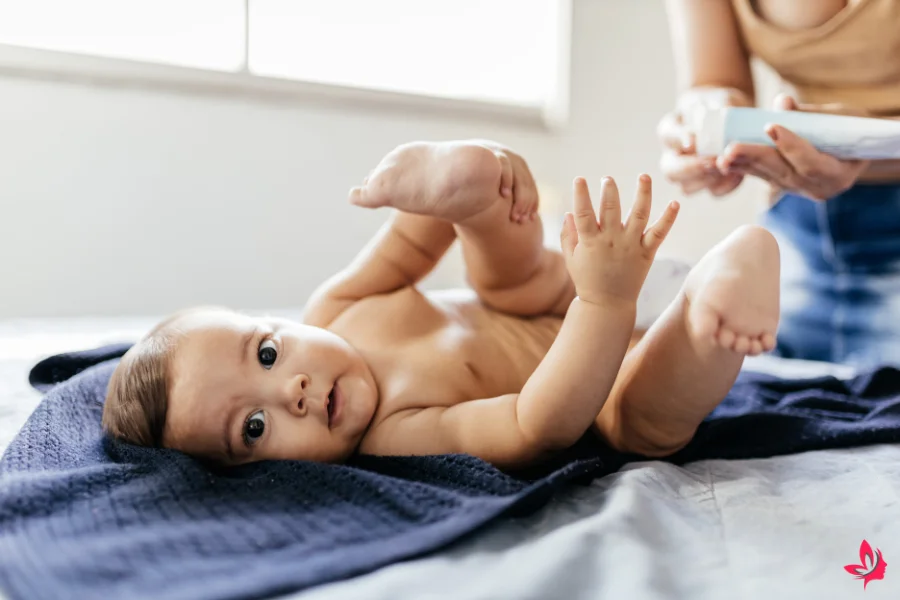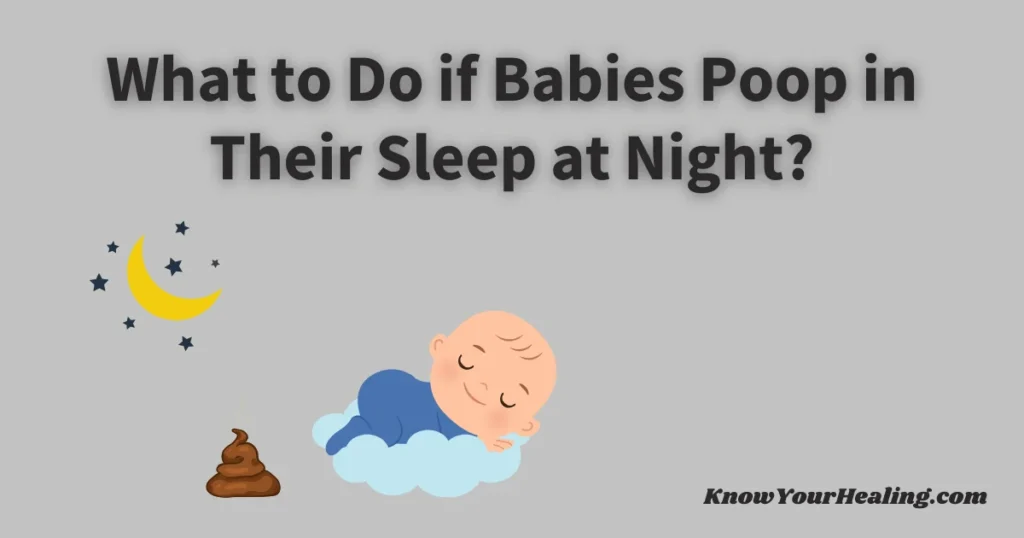Do babies poop in their sleep? Yes, and it can be a common issue for many parents, disrupting both the baby’s rest and the parents’ night.
To tackle this challenge, it’s crucial to have a plan in place that ensures your baby remains comfortable and you get a good night’s sleep.
This article will explore practical tips and considerations to help manage nighttime bowel movements.
Babies may not always have predictable patterns, but understanding why and how these incidents occur can help parents better anticipate and respond.
For example, as reported by Stanford Medicine Children’s Health, many babies develop the ability to sleep through the night as they grow, reducing nighttime disturbances like pooping and feeding.
Changing diapers can disturb a baby’s sleep, so knowing when and how to do it smoothly is key.
Some parents choose to use disposable diapers at night to prevent multiple disturbances.
Additionally, planning a diaper change before babies enter deep sleep can minimize disruption and keep them more comfortable all night.
Comprehending Infant Sleep Patterns

Infant sleep patterns are distinct from those of adults, often leaving parents of newborns puzzled. Recognizing these unique characteristics helps in adjusting and responding to nighttime events like baby poop concerns.
Sleep Cycles and Behaviors
Most newborns experience short sleep cycles of about 50 to 60 minutes. During these cycles, they experience REM (rapid eye movement) and non-REM sleep, which differ from adult cycles.
Newborns, particularly during the early weeks, alternate between deep and light sleep periods, which can cause them to wake up more frequently. This fragmented sleep pattern can cause more disruptions for parents.
Breastfed babies and formula-fed babies have distinct sleep patterns.
Breastfed babies might wake up more often as breast milk digests quickly, requiring regular feeds.
Formula-fed babies tend to sleep longer since formula takes longer to digest.
Understanding these cycles can help caregivers anticipate when nighttime diaper changes may be necessary to address a poopy diaper or other disturbances.
Differences from Adult Sleep
Babies’ sleep is notably different from adult sleep in the ability to enter deep sleep.
Infants spend more time in lighter stages, which may cause them to wake at nap time or in the middle of the night.
Unlike adults, they lack a fully developed circadian rhythm until around 3 to 6 months.
During the newborn phase, their sleep is not governed by day and night cycles.
This difference is significant because it helps explain why babies might have multiple poopy diapers at unconventional hours, prompting the need for diaper rash prevention.
Parents need to be patient during these periods, knowing that regular nighttime wakes, including those to change a dirty diaper, are part of young babies’ developmental growth and healthy sleep habits.
Adjustments to sleep training can help parents manage a baby’s natural sleep patterns while addressing baby poop incidents efficiently.
Reasons Babies Poop During Sleep

Babies may poop during sleep due to the development of their digestive systems and the types of foods they consume. Understanding these reasons can help parents manage nighttime diaper changes and ensure healthy sleep habits for their little ones.
Digestive Development
Young babies have developing digestive systems, which can result in frequent bowel movements.
Babies, especially newborns, often have immature digestive systems that lead to infant poops during sleep. Newborn babies have little control over their bowel movements as their digestive system and muscles mature.
Newborn poop can happen frequently due to rapid digestion. This is common for breastfeeding babies, whose smaller stomachs process breast milk quickly.
As babies grow, their digestive tracts develop further, often reducing the number of times they poop during naps or nighttime.
Parents of newborns might notice fewer nighttime diaper changes as their baby reaches several weeks of age.
Dietary Influences
What babies eat plays a significant role in their bowel movements.
For instance, breastfed babies tend to have frequent bowel movements due to the easy digestibility of breast milk.
On the other hand, formula-fed babies may experience different patterns due to formulas having different nutrient compositions, leading to formula-fed poop.
When introducing solid food, like sweet potatoes, baby’s poos may change in texture and frequency.
This can lead to more nighttime diaper changes as their bodies adjust to new foods.
Diet changes can also result in poopy diapers during sleep, particularly when foods high in fiber are introduced.
It’s a good idea for parents to keep track of meal times and monitor changes in their baby’s poop, consulting healthcare providers if they notice any signs of constipation or dietary concerns.
Preventive Measures

Preventing nighttime poopy diapers can help ensure restful sleep for both babies and parents. By managing feeding times and choosing the correct diaper, parents can reduce the chances of their baby waking up due to a dirty diaper.
Proper Feeding Timing
Timing feedings can significantly impact an infant’s bowel movements during the night.
Ensuring breastfed babies have milk during the day can reduce nighttime feedings and help stabilize their digestive rhythm.
Formula-fed babies may benefit from a regular feeding schedule to minimize unexpected bowel movements.
Introducing solid food should be done gradually, as new foods can change the baby’s poop schedule.
Paying attention to meal times and making minor adjustments can prevent sleep disruption.
Parents might want to keep a food log to track how foods affect their baby’s bowel movements.
Diaper Selection and Fit
Choosing the correct diaper can make a big difference in overnight comfort.
Overnight diapers are designed to handle more fluid, reducing the risk of leaks or discomfort that can wake a baby.
A proper fit ensures the diaper stays snug, preventing leaks around the legs and waist.
For young babies, cloth diapers might be a preferred option as they offer better airflow, which can help avoid diaper rash.
When fitted well, disposable diapers can provide ease of use and strong absorption.
Parents should also pay attention to any signs of irritation or diaper rash and consult healthcare providers if they notice a persistent issue.
Responding to Nighttime Incidents

Babies sometimes have bowel movements while they sleep, which can be challenging for parents. Addressing these incidents promptly ensures the baby’s comfort and hygiene.
Safe and Hygienic Cleanup
Changing a poopy diaper in the middle of the night can disturb a baby’s sleep, but it is necessary to avoid diaper rash and discomfort.
Start by gathering all supplies near the crib, including clean diapers and wipes. This way, minimal light is required, keeping the baby’s room dim and calm.
Keeping a wet bag nearby could be a good idea for parents who prefer cloth diapers.
Using overnight diapers helps reduce disturbances by absorbing moisture effectively.
To prevent irritation, ensure the baby’s bottom is clean and dry.
It’s also helpful to apply a barrier cream to protect sensitive skin.
Properly dispose of dirty diapers to maintain a clean environment.
If the baby is very young and uses breast milk, their poop is usually less odorous and easier to clean.
Comforting Your Baby
After a diaper change, some babies might be unsettled.
To ease them back to sleep, try gently rocking or patting them.
Minimizing talking or bright lights is important, as it can cause further weakening.
Consistency in soothing actions helps reinforce healthy sleep habits.
Breastfed babies often find comfort in nursing if they wake up fully during a change. Meanwhile, formula-fed babies might benefit from a small comforting bottle, depending on their age and needs.
Keeping the environment calm helps the baby transition smoothly back to sleep, supporting longer stretches of sleep, which are beneficial for both the baby and the parents.
Health Considerations

When babies poop in their sleep, it’s important to distinguish between normal and concerning patterns. Understanding what is typical for a baby’s stage of development can help ensure their health and comfort during sleep.
Identifying Abnormalities
Newborn babies often have frequent bowel movements, especially breastfed babies, resulting in many wet diapers and poopy diapers.
While a variety of factors can affect the color and consistency of a baby’s poop, paying attention to any drastic changes is a good idea.
For instance, green poop or black poop can indicate dietary changes or other issues in the digestive system.
Solid food introduced to a baby’s diet can alter bowel habits.
Monitoring these shifts and maintaining a food log helps parents see how new foods impact their baby’s poos.
Consistently hard poop may signal constipation, requiring a healthcare provider’s attention.
Staying vigilant about a baby’s bowel movements helps identify potential signs of a problem early on.
If a baby shows discomfort and difficulty with bowel movements, it might indicate infant dyschezia, a common condition in young babies.
When to Consult a Pediatrician
Parents should consult a pediatrician if their baby experiences particularly infrequent bowel movements or obvious discomfort during sleep.
It’s crucial if symptoms suggest a possible medical condition, like excessive crying or a distended belly, that may indicate true constipation.
A healthcare provider becomes especially important if a baby produces unusual stools, such as dark green or transitional stools that persist for more than a few days.
Regular visits promptly address concerns about a baby’s health or digestive system.
Frequently Asked Questions
New parents often wonder about managing their baby’s nighttime pooping. This section addresses common concerns regarding changing diapers and understanding nighttime bowel movements.
Is it normal for a baby to poop during sleep?
Yes, it is common for babies to poop while sleeping. Infants lack control over their bowel movements, especially during the first few months. As they grow, the frequency usually decreases.
Do you wake a sleeping baby if they pooped?
If your baby has pooped, it is generally advised to wake them gently. This prevents diaper rash and discomfort. Use soft lighting and minimal noise to avoid fully waking them.
Is it OK to let a baby sleep in a poopy diaper?
Letting a baby sleep in a poopy diaper is not recommended. Prolonged exposure to a soiled diaper can cause diaper rash and skin irritation. It is best to change the diaper as soon as possible.
What causes a child to poop while sleeping?
Several factors can contribute to a baby pooping during sleep. These include their feeding schedule and activity levels before bed. As babies’ digestive systems mature, they usually poop less frequently at night. Understanding sleep patterns can help manage nighttime incidents.
How long can a baby sit in a poopy diaper?
It is advisable not to leave a baby in a poopy diaper for more than a few minutes. Extended contact can lead to discomfort and skin issues. Quick changes help maintain hygiene and comfort.
Should I wake my baby to change her diaper?
You should wake your baby to change a soiled diaper. This will ensure that their skin remains healthy and reduce the risk of irritation.
For wet diapers, you can often wait until they naturally wake.




